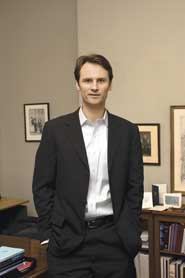Discussing Internet law with the director of the Berkman Center
Post Date: January 19, 2006
John Palfrey, executive director of the Berkman Center for Internet & Society, was recently appointed clinical professor of law, a new position that recognizes his leadership in developing programs that give students real-world experience in cyberlaw litigation, client counseling, research and related issues. Here, Palfrey speaks with contributor Elaine McArdle about his work.
Why is clinical work so valuable in the field of cyberlaw?
Over the past 10 years, the field of Internet law has emerged and has brought with it a series of distinctive and tricky questions which implicate international law, fast-changing technologies and the intersection between markets, social norms and public policy. As the Internet becomes more important to many aspects of our lives, and to the lives of people around the world, the Berkman Center seeks to improve ways of teaching and learning about it. It’s not that the old tools don’t work. It’s just that in some ways, new teaching and research tools can help crack the hardest problems associated with cyberlaw and can make the learning experience particularly rich for the students involved.
How does the Berkman Center’s clinical program work?
It’s closely related to the regular curriculum we teach. A student’s clinical work is always attached to a course. For example, if you take the Practical Lawyering in Cyberlaw course in the fall, then you might take a clinical in the spring that’s pertinent to that. It’s hands-on, and our view has been that the best way to understand cyberspace is to get your hands dirty.
What are some examples of students getting their hands dirty?
Often it’s writing amicus briefs in cases where we feel there is some important public policy issue that might get resolved through litigation. While we rarely represent litigants directly, we’ll frequently take on the job of filing an amicus brief on one side of a dispute. As many as a dozen students will work with clinical instructors and our faculty to develop a position and draft the brief. We’ve filed briefs in a number of federal cases. Over a dozen students worked on drafting an amicus brief for the Grokster [file-sharing] case, which was argued before the U.S. Supreme Court last spring.
The MacArthur Foundation, which has supported the Berkman Center in the past, just awarded you a $3 million grant. How do you plan to use it?
The grant will support our study of the ways in which states around the world block their citizens from access to the Internet. If you’re a Chinese citizen, for example, you see a very different Internet than someone in the U.S. Through the OpenNet Initiative, the Berkman Center, along with researchers at the Citizen Lab at the University of Toronto and the Advanced Network Research Group at Cambridge University, monitors Internet filtering and surveillance throughout the world. This grant will enable us to develop an annual book that describes the state of the Internet. We’ll seek to report on every state in the world we know to be filtering the Internet. So far, we’ve picked off the most obvious actors and written extensive reports. Now we’ll be able to do an extensive, global survey and compare filtering practices over time, so you can see trends as well as regional differences.
Why is this important?
As the Internet becomes an increasingly important tool for political activism, it’s a battleground where states attempt to block access to information that is thought to be politically or culturally subversive. But there are many problems with this. It’s not possible to block the Internet effectively. So, for example, in trying to block pornography, as Saudi Arabia does, the state may decide to underblock—which is to block fewer than the total number of sites that meet their criteria—but there will be leakage, and some porn will get through. On the other hand, if you want to be sure to block all porn, you have to be overbroad. So, in this example, you’ll also block many sites on breast cancer. None of the current techniques is very effective. You have to accept a certain amount of imprecision—almost certainly too much, from a U.S. law point of view—if you want to filter. We’ve shown that empirically and will continue to show that over time.
Does the Berkman Center assist citizens of such states in trying to get less filtered access to the Internet?
We don’t give people ways to get around the censorship. It’s super controversial, as you can imagine, since it may be illegal in some places to supply the tools to evade the censors. People who are clever technically can almost always get around the filters, though. Tell us about your interest in the Internet’s role in democracy.
I’m interested in the extent to which people can use the Internet to strengthen democracy. Consider how anyone with access to the Internet today can publish something, for free, that’s heard throughout the world. Global Voices Online is a project at the Berkman Center that publishes one of the world’s largest collections of news from citizen journalists around the world. Our regional editors blog about stories being told by individual writers that aren’t usually covered by mainstream media, and we put them in a single contextual framework. We launched this site less than a year ago, and today we have 300,000 unique visitors a month. Global Voices just won an award recently as the best international news blog. Harvard Law students, like Ory Okolloh, as well as the Berkman fellows who founded it, Rebecca MacKinnon and Ethan Zuckerman, have played the key roles in the success of Global Voices.
